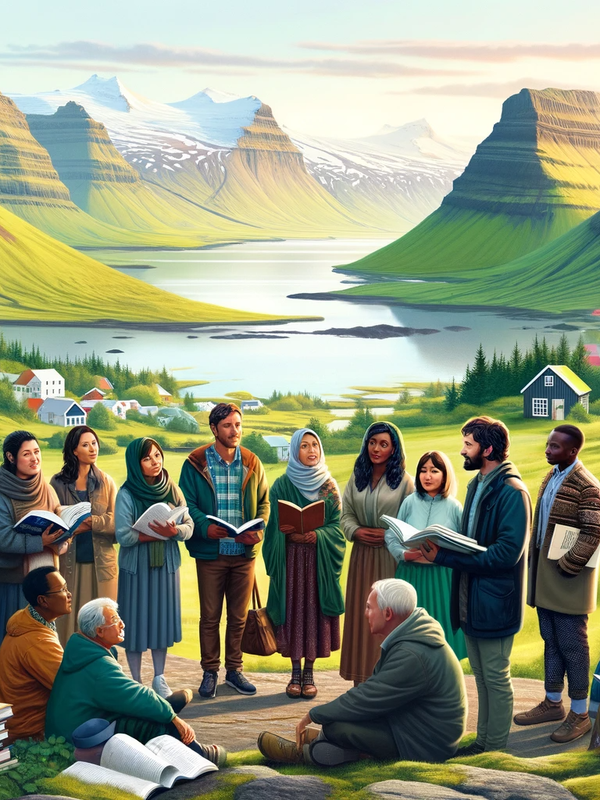
Languages Spoken in Iceland: A Comprehensive Overview
Icelandic is the official language of Iceland, spoken by the majority of the population. However, English is widely spoken and understood, making it easy for visitors to communicate.
In addition, Danish and other Nordic languages are also spoken due to historical and cultural influences. With a diverse linguistic landscape, Iceland offers a unique and welcoming environment for travelers from around the world.
- Icelandic is the official language of Iceland
- English is widely spoken and understood in Iceland
- Danish is also spoken by some Icelanders
- German and French are spoken by a small percentage of the population
- Spanish and Polish are also spoken by some immigrants in Iceland
Is English widely spoken in Iceland?
Yes, English is widely spoken in Iceland. The majority of Icelandic people speak English fluently, making it easy for visitors to communicate while exploring the country.
This is due to the rapidly growing tourism industry, which has led to English becoming one of the most widely spoken foreign languages in Iceland.
Is Finnish spoken in Iceland?
No, Finnish is not spoken in Iceland. The official languages in Iceland are Icelandic and English. However, Icelandic belongs to the West Scandinavian group of languages, along with Norwegian and Faroese, and there are English speakers in Iceland as well.
So while Finnish is not spoken in Iceland, there is still a diverse linguistic landscape in the country.
Is Icelandic similar to Danish?
Despite their differences, Icelandic and Danish share many similarities in vocabulary and grammar. While some words may be easily recognizable between the two languages, the complexities of Icelandic make it difficult for most Danes to understand.
Despite this, the linguistic connection between the two languages is evident, highlighting their close relationship within the Scandinavian language family.
Exploring the Multilingual Landscape of Iceland
Iceland's multilingual landscape is a fascinating blend of Icelandic, English, and other languages. With a population that is highly proficient in English, visitors will find it easy to communicate and navigate the country.
However, the preservation of the Icelandic language is a priority, and efforts are made to promote its use in daily life and education. This unique linguistic environment adds a rich layer to the cultural tapestry of Iceland, making it a truly captivating destination for language enthusiasts and travelers alike.
Uncovering the Diversity of Languages in Iceland
Iceland may be a small country, but it is home to a surprisingly diverse array of languages. In addition to Icelandic, which is the official language, there are also communities of speakers of English, Danish, and various other languages. This linguistic diversity reflects Iceland's history as a hub for international trade and immigration, and adds a rich layer of cultural complexity to this unique island nation.
A Closer Look at Iceland's Linguistic Mosaic
Iceland's linguistic landscape is a rich and diverse mosaic that reflects the country's complex history and culture. With Icelandic as the official language, the nation also boasts a wide array of minority languages, including Danish, English, and Polish. This linguistic diversity is a testament to Iceland's openness to the world and the influence of different cultures on its society.
The Icelandic language, with its ancient roots and unique phonology, is a source of national pride and identity. Despite the increasing use of English in the country, Icelandic remains the dominant language in everyday life, government, and education. The preservation and promotion of Icelandic is a crucial aspect of Iceland's cultural heritage, as it embodies the nation's rich literary tradition and historical continuity.
In addition to the official languages, immigrant communities in Iceland have also brought their native languages, creating a vibrant linguistic tapestry. This linguistic diversity enriches the country's cultural landscape and contributes to its global outlook. The coexistence of various languages in Iceland exemplifies the nation's commitment to inclusivity and respect for linguistic diversity, making it a fascinating and welcoming destination for language enthusiasts and travelers alike.
In Conclusion
Iceland is a multilingual country with Icelandic as the official language and English widely spoken as a second language. While Icelandic remains the dominant language in daily communication, the presence of other languages such as Danish and German reflects the diversity of the population and its connections to the global community.
Understanding the linguistic landscape of Iceland provides valuable insight into the country's culture, history, and its position in the modern world.
